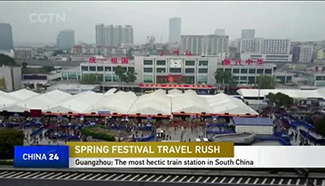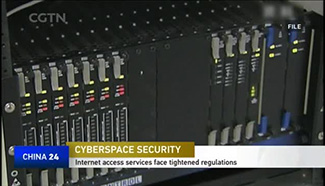SHANGHAI, Jan. 25 (Xinhua) -- Over three years after its launch,the Shanghai pilot free trade zone (FTZ), the country's first, pledges new measures to facilitate trade and investment this year, as many of its experiences have been promoted elsewhere nationwide.
"The Shanghai FTZ will conduct more reforms to enhance trade facilitation," said Shang Yuying, head of the Shanghai municipal commerce commission, adding the first three years mainly focused on investment opening-up.
The FTZ's negative list, which restricts foreign investment, is set to be further shortened, after the number of items on it has been cut by one-third, from 190 to 122.
SETTING EXAMPLE
As a beneficiary of the reform, the first foreign-funded vocational training school opened in the Shanghai FTZ in mid-January. Such foreign investment would not be possible without the FTZ.
So far, the Shanghai FTZ has adopted 54 measures to open up sectors such as modern services and high-end manufacturing.
More than 7,300 foreign-funded enterprises have been established in the Shanghai FTZ since it launched in September 2013. The 121-sq-km FTZ in Pudong New Area covers 2 percent of Shanghai's total area and produces a quarter of the city's GDP.
The FTZ has had 40,000 new companies registered, surpassing the number in the area for two decades prior to the launch of the FTZ. The average logistics costs for companies here have fallen by 10 percent. Over 60,000 free trade accounts have been opened.
China approved a second batch of three FTZs in Tianjin Municipality, and the provinces of Guangdong and Fujian in 2014, and a third batch of seven FTZs last August.
The negative list system is also used in Tianjin, Guangdong and Fujian FTZs.
As China presses ahead with structural reforms for innovation-driven growth, such free trade zones have become attractive to investors and contributed to reforms with their policy innovation and opening up in industry, finance and other sectors.
The country aims to use the example of FTZs to promote economic restructuring nationwide.
"Some 114 items of pilot FTZ reform experiences have been replicated nationwide," said Sun Jiwen, spokesman for the Ministry of Commerce (MOC) last Thursday, adding that many more would be replicated later this year.
SEVEN MORE TO BE LAUNCHED
It is expected that the seven approved FTZs will be established.
Local governments are gearing up for the inaugurations of FTZs in Liaoning, Henan, Zhejiang, Hubei, Chongqing, Sichuan and Shaanxi. They have made it a key task to explore the full potential of FTZs in local economic restructuring.
"The FTZ in central China's Henan is expected to be launched in late February," said Jiao Jinmiao, head of the Henan Provincial Commerce Department Sunday.
"Personnel training is underway," he said, adding the province has formulated supporting policies for the FTZ.
The province will speed up the FTZ construction focusing on trade upgrading and innovation in finance and investment, said Jiao.
In fact, FTZs have become a major means for these provinces to participate in national development strategies such as the Belt and Road Initiative, the Yangtze River Economic Belt and the coordinated development of Beijing, Tianjin and Hebei.
"The FTZ is the most important opportunity for Hubei to deepen supply-side structural reform," said Zou Wei, deputy director of the Institute of Advanced Study at Wuhan University.
"The FTZ in central China's Hubei will receive some industrial transfers and build bases for strategic emerging industries to make the province play an active role in the rise of the central region and the Yangtze River region," Zou said.
LEGAL SUPPORT FOR HIGH-LEVEL OPENING UP
China will establish unified and transparent market access rules and boost reform in the commercial registration system to improve market access, according to the 2016-2020 plan released by the State Council on Monday.
Earlier this month, the central government announced more measures to attract foreign investment, promising easier access and better environment.Foreign firms will face fewer restrictions when entering service, manufacturing and mining sectors.
China's FTZs are expected to make more reforms.
"Some overseas companies pointed out there was a gap in services and efficiency between the Shanghai FTZ and other places such as Singapore," said Tu Haiming, a municipal political advisor in Shanghai.
"The Shanghai FTZ will find out its weak links by referring to the most advanced standards, deepen institutional innovations and improve the negative-list centered investment management," said a city government work report in mid-January.
Yin Chen, an FTZ researcher at Fudan University in Shanghai, said that the sectors with integrated reform measures were a success, while the fields lacking reform integration had made slow progress.
Some call for more legal support for FTZs.
Some old trade rules no longer fitted the new trade developments as China's foreign trade used to focus on primary products, but today many were high-tech products such as integrated circuits and biomedicine, according to a municipal official.
"To keep in line with international standards, some rules related to the FTZ need adjustment," said the official.














